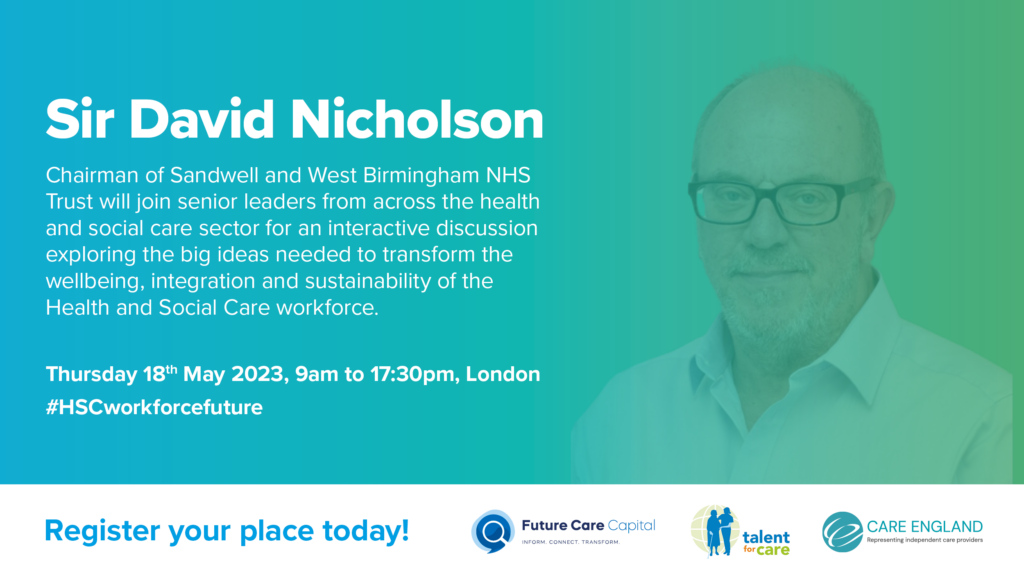EXCLUSIVE: NHS and care home leaders to discuss workforce sustainability and integrated care

A major event next month will see senior NHS and care home leaders come together to challenge artificial boundaries and explore much needed innovation for the sustainability of the health and social care workforce. Event organiser and speaker Professor Irene Gray and Andrew Whelan, chair of co-funder, Future Care Capital, tell us more.
Held in King’s Cross, London on 18 May Health and Social Care Workforce: Wellbeing, Integration and Sustainability, which is also co-funded by Care England and Talent for Care, will bring together senior leaders from the NHS and social care to discuss workforce sustainability and Integrated Care Systems.
Keynote speakers include Sir David Nicholson, chairman, Sandwell and West Birmingham NHS Trust, Liz Kendall MP, shadow minister for health and social care, Professor Martin Green OBE, chief executive, Care England, Joanne Balmer (BEM), chief executive, Oakland Care, Oonagh Smyth, chief executive, Skills for Care, Professor Deborah Sturdy, chief nurse for adult social care and Alessandro Alagna, Director, Talent for Care.
“We had a few webinars last year and moved towards thinking we really need to be trying to get senior NHS, care home people and social care people in the same room discussing their joint problems and challenges,” Gray told Caring Times.
Gray said one of the drivers behind the programme had come from a recent training programme launched by Nicola Ranger, director of nursing at the Royal College of Nursing.
“Nicola had started to share her training programmes with the local care home sector so they could get to know each other and recognise that they have the same skill set,” Gray told us. “That contributed to our idea for an event about the wellbeing of staff, sustainability of staff for the future and how we achieve that integration and how we can only really get that integration by getting people together at the table to accept and acknowledge that health and social care is one system.”
Whelan added: “The Future Care Capital philosophy for change is to facilitate bringing together all the right people in the room. People often try to do that but they sit in their own silos and look at problems and solutions separately. What we are saying is it doesn’t really matter where you sit we are all part of the solution and the system should be seen as a whole. It’s a health and care system whereas the public just think of the NHS.
“When you introduce nurses from the NHS into a care home they are quite surprised at what they are being asked to do and what responsibilities they have that they hadn’t had before. This event is to begin that process of opening people’s eyes and having some of the policymakers in the room to get them thinking about we need to do to make a lasting change.”
Keynote speakers on the event’s three strands of wellbeing, sustainability and the workforce will be followed by roundtable discussions led by industry experts.
The effective inclusion of the care home sector into Integrated Care Systems will be one of the key topics under debate.
“We are hoping to get something where we can put a marker in the sand and say we can do something different,” Gray noted. “I don’t believe for one minute we are going to change the world on the day but what I would like to think is that we have started a movement which is in the interests of patient care.
“We are there for one reason and that is excellence in patient care. If we can stop people languishing in hospital for long periods of time unnecessarily many of whom pass away unnecessarily then we should be able to do that.”
Gray listed representation of care homes at Integrated Care Board level, joint training across the sectors, regulation of care staff training and care staff professional recognition by the Nursing Midwifery Council as among the event’s key long-term goals.
Whelan added: “What I would like to see is that this is a start of a movement where the debate in the UK around health and care is about the outcomes and the provision that meets the needs that people have and that the debate is not about how much money is going into the NHS which is where it is stuck at the moment.
“It’s about reframing those questions so that social care becomes much more important to people and therefore influences policy. The sense that we have is that people receive the care they receive in spite of the system not because of it. Our vision is that they will be able to get the care that they need because of the system and that is by breaking down the barriers between what is perceived as more than one system currently so that you have a truly integrated system.
“If we can facilitate more of people not creating ‘us and them’ situations but respecting that people are doing wonderful jobs whether they happen to work for a private care home or in an NHS hospital. They are all trying to do better things and to provide better care.
“We have a great opportunity now with Integrated Care Systems. The high level intention is to make this happen but the devil is in the detail and implementation, and there is a danger it goes the way of all these other integration exercises where they are not implemented properly and people are left off the table and therefore don’t have a voice and it just becomes another silo talking to itself.”
If you would like to discuss being involved as a sponsor please contact Daren Thomas at Care England, [email protected].
To learn more about the event and book your tickets, visit: https://bit.ly/414h2jR




